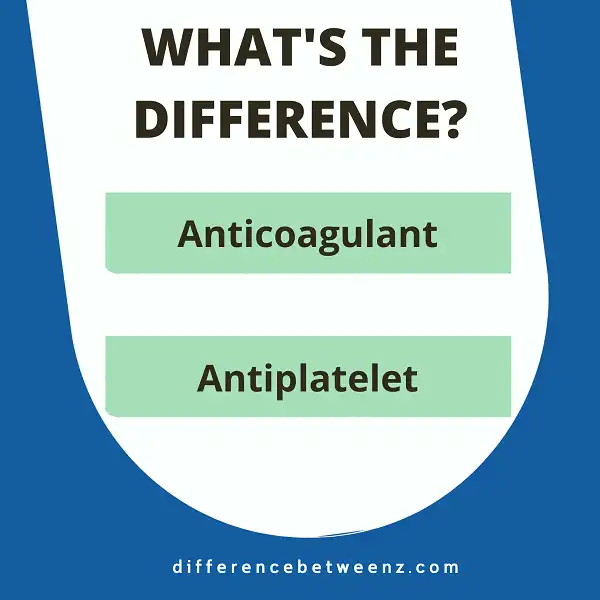Anticoagulants and antiplatelets are both medications used to reduce the risk of dangerous blood clots, such as deep vein thrombosis (DVT) or pulmonary embolism (PE). Whether you’re prescribed one or the other (or even both!), it can be confusing to know what they do and how they differ. In this blog post, we’ll explore this subject in-depth so that you have a better understanding of which medication is right for your individual needs.
What is Anticoagulant?
- Anticoagulants are medicines that reduce the ability of the blood to form clots, which can cause a range of medical issues including stroke, deep vein thrombosis, pulmonary embolism, and angina.
- Anticoagulants act as ‘blood thinners’ and help to keep the blood flowing freely and prevent it from clotting; this is especially important for those individuals who may be at risk of heart attack or stroke.
- Anticoagulation therapy is prescribed by physicians for a variety of health conditions, and it is often common for patients to require regular monitoring in order to track their levels. Anticoagulant medication should always be taken as directed by a healthcare professional, as there is potential for serious side effects if misused.
What is an Antiplatelet?
- Antiplatelet medications are a powerful tool in preventing and treating existing heart and blood vessel conditions. Antiplatelet medication helps to prevent the formation of potentially harmful clots, which can lead to strokes or heart attacks as well as other circulatory problems.
- The antiplatelet medication works by inhibiting cells called platelets from forming clots, allowing healthy circulation throughout the body. Antiplatelet medications achieve this without significantly damaging other types of cells in the body.
- In many cases, Antiplatelet medicines are administered orally in the form of a pill but may also be available via injection or intravenously. Antiplatelet medications are widely used in cardiology and those with any type of cardiovascular disorder should ask their doctor if Antiplatelet medicine is right for them.
Difference between Anticoagulants and Antiplatelets
Anticoagulants and antiplatelet drugs have different mechanisms of action to prevent the formation of blood clots in the body.
- Anticoagulants work by limiting the production of substances that cause clotting, thus slowing blood clotting time.
- Antiplatelets act on platelet cells, preventing them from sticking together and forming a clot.
- Anticoagulants are mainly used in treating conditions like deep vein thrombosis or pulmonary embolism whereas antiplatelets are used for patients at risk of stroke or those who have suffered a coronary event such as a heart attack.
Taking either type of drug can cause side effects including bleeding, easy bruising, and headaches, so it’s important to work with your doctor to decide which one is best for you.
Conclusion
If you can tap into how your customer’s brains work at different stages in the purchasing process or lead funnel, you may be able to drive more sales with less effort. The neuroscience sales tips we’ve provided should help you get started thinking about how you can leverage the power of the human brain in your own digital marketing strategy.


